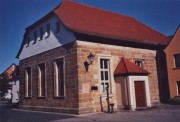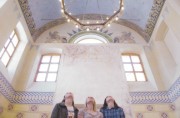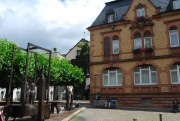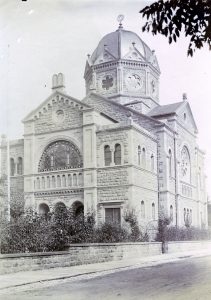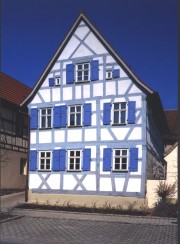Altenkunstadt (County of Lichtenfels, Upper Franconia)
Synagogue
The Altenkunstadt Synagogue dates back to 1726. For more than 200 years it was a religious and cultural center for the local Jewish community. During the 1938 November Pogrom against Jews and their property, the synagogue’s interior was destroyed and the building was expropriated for other uses: it held prisoners of war, refugees and expellees. (weiterlesen)
Ansbach (Middle Franconia)
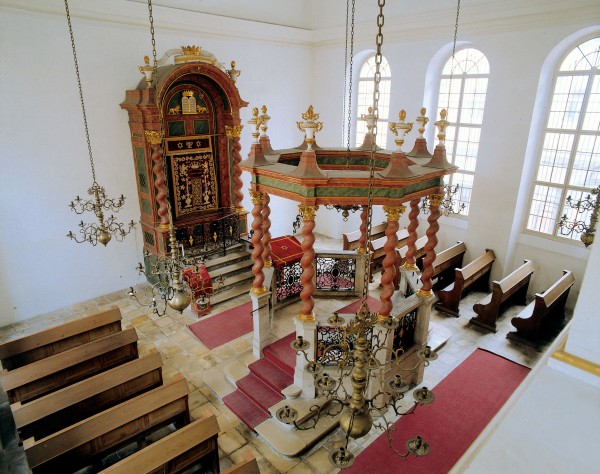
Interior of the synagogue © Alexander Biernoth
Synagogue
There is evidence of Jewish life in Ansbach going back to the early 14th century. Leopold Retty built a baroque-style synagogue there between 1744 and 1746. Damaged during the anti-Jewish pogrom in November 1938, the house of worship was forcibly sold to the local municipality. It was turned into a food warehouse in 1945. Soon after the war, (weiterlesen)
Arnstein (County of Main-Spessart, Lower Franconia)
Former Synagogue
Jews were living in Arnstein as early as the Middle Ages. In addition to a school and mikveh (ritual bath) the Jewish community built a synagogue in 1819; renovations were undertaken in 1869, 1905 and 1934. The increasingly anti-Jewish atmosphere in the 1930s prompted many local Jews to emigrate. The synagogue was no longer used for religious services. After the pogrom of November 1938, the (weiterlesen)
Aschaffenburg (Lower Franconia)
Museum of Jewish History and Culture
The Jewish community of Aschaffenburg was one of the largest in Bavaria. The permanent exhibition covers the arc of history from the first Jewish school in 1267 to the time of persecution under National Socialism. Documents such as photographs, newspaper reports and ads illustrate the (weiterlesen)
Bad Kissingen (Lower Franconia)
Jewish Community Center
There is evidence that a Jewish community was established in Bad Kissingen in 1500; references to Jewish inhabitants go back even further, to the Middle Ages. The self-confidence and patriotism of this Jewish community, one of Bavaria’s largest in the Weimar period, would be reflected in the New Synagogue, built in 1902. It was set afire in 1938 by local SA-men and damaged; in 1939 it was torn down on the orders of the town council. In 1942, the last Jews of Bad Kissingen were deported. (weiterlesen)
Buttenheim (County of Bamberg, Upper Franconia)
Museum at Birthplace of Levi Strauss
Löb “Levi” Strauss, son of a peddling “country Jew” and inventor of blue jeans, was born on 26 February 1829 in the Franconian town of Buttenheim. His biography is the epitome of the American dream. After the death of his father, he immigrated to America in 1848. In San Francisco he began producing durable, blue work trousers. (weiterlesen)
Ermreuth (Neunkirchen am Brand, County of Forchheim, Upper Franconia)
Synagogue and Jewish Museum
The synagogue of Ermreuth, still standing today, was dedicated in 1822. It replaced the first house of worship – which dated back to 1738 – and was one of the largest synagogues in Upper Franconia. With two floors, Torah Ark, bimah with reading desk, pews for 94 men as well as a women’s gallery on three sides, the building was unusually stately for such a small village community. The building was severely damaged in the pogrom of November 1938 and furnishings and ritual articles were destroyed and stolen. The synagogue’s location in the thickly settled town center was the factor that saved it from being torn down. Local Jewish residents were forced to move to Nuremberg. From there, they were deported and murdered. (weiterlesen)
Fürth (Middle Franconia)
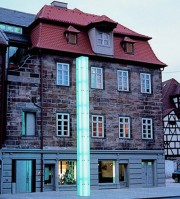 The Jewish Museum Franconia in Fürth
The Jewish Museum Franconia in Fürth
The Jewish Museum Franconia in Fürth is accommodated in a former Jewish apartment building, whose core dates back to the 17th century. Up to the late 19th century, it was owned by different Jewish families. The magnificent features of the house, with its historical sukkahand ritual bath, bear superb witness to everyday Jewish life at this time.
Franconia is considered a cradle of Jewry in Southern Germany and Fürth as a former Jerusalem of this region. The museum’s permanent exhibition covers the rich history of Jews in Franconia from the Middle Ages to today, with Judaica and many personal items as well as film and audio contributions. (weiterlesen)
Gaukönigshofen (County of Würzburg, Lower Franconia)
Former Synagogue
The earliest reference to the synagogue in Gaukönigshofen was in 1769. In addition to the synagogue, the Jewish community – which existed through 1942 – had a community house with a classroom and a mikveh (ritual bath).
During the anti-Jewish pogrom of November 1938, members of the SS and SA destroyed and burned the synagogue’s furnishings and ritual objects, with help from local inhabitants. Its close proximity to other buildings probably protected the synagogue from complete destruction. In June 1939, the synagogue was passed on to the municipality of Gaukönigshofen for a fraction of its true value, just like the Jewish community center with its school and teacher’s apartment.
After 1945, the building served as an apartment building and warehouse. In 1988, the building was renovated and a memorial established. The historical synagogue and mikveh are open to the public. The main area of the synagogue is now a memorial site. The former teacher’s apartment houses an exhibition on the history of the former Jewish communities of the Würzburg district. An audio-visual presentation, photos and documents supplement the tour.
Former Synagogue
Am Königshof 22
D-97253 Gaukönigshofen
Tel. +49 (0)9337 97190
Fax +49 (0)9337 971999
www.gaukoenigshofen.de
Opening hours:
every first Sunday a month
May-Oct: 2pm – 4pm;
closed November – April
Tour booking:
Commune Gaukönigshofen
Tel. +49 (0)9337 97190
info@gaukoenigshofen.bayern.de
Georgensgmünd (County of Roth, Middle Franconia)
Former Synagogue and Jewish Cemetery
As early as the 16th century, Georgensgmünd had a Jewish community. A synagogue was built in 1734. In the 19th century, the Jewish population gradually shrank due to emigration; by 1933, there were only 35 Jews in the village and in 1938, the authorities forced the town’s last Jewish inhabitants to sell their possession and leave. The synagogue was sold in September 1938 to the baker next door; it was thus protected from destruction. (weiterlesen)
